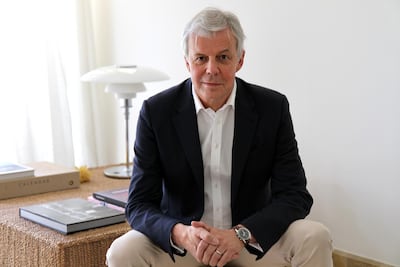The Arabic version of popular British reality food show Come Dine with Me is set to go on the road.
After its successful debut on Dubai's pan-Arab broadcaster OSN in October, network chief executive Patrick Tillieux tells The National the second season of Yalla Neta'asha will take place outside the UAE.
"Considering the situation with the pandemic, we are deciding on which location, but we are excited about taking the concept around the Arab world," he says. "The show has been very popular because of the food, but most importantly because of the personalities and their stories."
That said, another course could be dished up for UAE fans.
Tillieux says a special Ramadan version of Yalla Neta'asha is in the works and will probably be shot in Dubai.
OSN goes original
And 2020 has certainly been a big year for OSN. This month, the network formally launched OSN Originals, an umbrella for content created with regional and international producers.
When it comes to the former, Yalla Neta'asha is part of an opening wave of Arab-produced content, including the UAE-shot men's talk show A'adet Regala and soon-to-be-released Egyptian film Curfew, which will premier at the coming Cairo International Film Festival.
On the international front, OSN co-financed the now-available drama No Man's Land, set in Syria and shot in Morocco.
Tillieux says the move to original content is not only a natural industry progression, but a response to evolving audience tastes.
Where OSN initially made its mark in the region by exclusively premiering hit shows from the US and the UK, viewers are now more drawn to stories closer to home.
“They want to see themselves represented on the screen,” he says. “It is now about stories that tap into their aspirations and passions.”
Tillieux refers to internal data figures to prove the shift is already under way.
"This week, we had a real exciting development in that Games of Thrones is no longer the most-watched show on the platform," he says. "Instead, it is the Gulf drama Worroud Moulawna. This is almost like a mini-revolution because Game of Thrones has been on top for months. This fuels our direction in creating original content. It reinforces our thinking."
A golden time for content creators
This is one of many reasons why Tillieux, a three-decade Belgian television industry veteran who previously worked in executive posts at European broadcasters Canal + Holland and France's TF1, hails this period as great for content creators.
"This is a golden time and I don't think many people realise the opportunities available," he says. "If I was younger, I would like to start a production company because what is available in the industry today, compared to previous years, is amazing."
While talent in the region is immense, the industry needs more time to develop.
"There are absolutely great writers in the region now and historically, so storytelling is not a problem," Tillieux says.
“There is room for improvement when it comes to production standards, but that is common. We are only at the beginning of an industry that is still being shaped. There is Hollywood and Bollywood and even Nollywood in Nigeria. I am still waiting for the Arab version of that and I do think that it can happen in time.”
Until then, OSN is looking forward to collaborating with Arab producers and a great idea is all that's needed to get the ball rolling, Tillieux says.
“My message to the creative community is, come see us,” he says. “We want to hear your ideas, no matter how big and weird they are. The door is always open, so let’s talk.”
The future of linear television
OSN enhanced its online platform, OSN Streaming, by securing exclusive regional rights to Disney content in April, so does that spell the demise of its string of linear channels?
Not so fast, Tillieux says. While streaming is now the dominant form of television consumption, linear channels still have role to play, albeit a different one.
For a possible insight into its future, Tillieux points to some of the innovations in the music industry.
“We may move in the direction where linear channels are no longer channels any more but almost similar to playlists,” he says. “So, instead of you trying to pick something from this mountain of content you can watch online, for example, you can watch three back-to-back movies or programmes that are similar in style and mood.”
Tillieux is already tantalised by the prospect.
"I can imagine people just relaxing after work and watching back-to-back episodes of Yalla Neta'asha, for example," he says. "That will be a great way to put anyone in a good mood."



